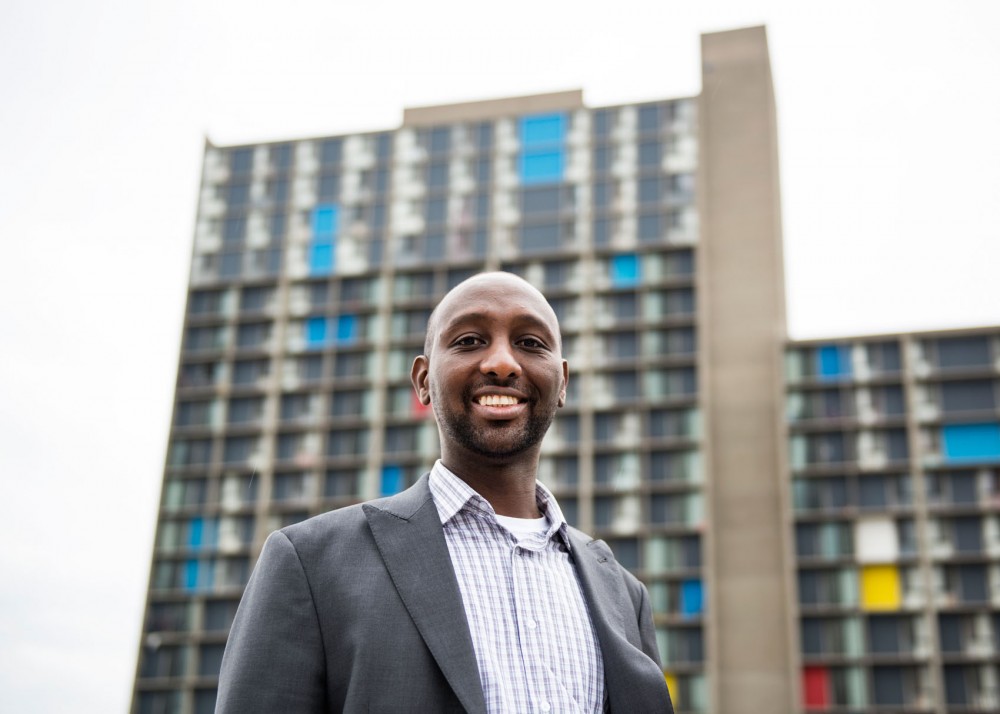On his second day in the U.S., Minneapolis police stopped Mohamud Noor. He was a young Somali immigrant whose family had just arrived from a Kenyan refugee camp.
But on Lake Street, Noor said, all he found was hostility. He didn’t know where he was going, couldn’t find anybody willing to help him and had no proof of residency — no identification papers.
The police officers who approached Noor told him to put his hands up and searched his pockets. Finding nothing suspicious, they left him, he said.
“That was my welcome to America,” he said. “My expectation was … that [I would] have a better life, better opportunities as an American.”
A little more than a decade later, Noor will challenge one of the longest-serving members in the Minnesota Legislature for the DFL endorsement in House District 60B, which includes parts of the Prospect Park, Cedar-Riverside, Seward, Nicollet Island and Marcy-Holmes neighborhoods, as well as the University of Minnesota.
Noor will compete with 44-year incumbent Rep. Phyllis Kahn for the second time in two years. Political activist Ilhan Omar is also seeking the party’s nomination, which will be handed out on Saturday.
Noor was one of Kahn’s toughest challengers in recent memory when he ran against her in 2014. He mobilized the Somali community behind him and blocked Kahn from getting the DFL endorsement, forcing a primary race between the pair.
Kahn survived with 54 percent of the vote to Noor’s 46 percent.
“It was one of the closest elections I’ve ever had,” Kahn said, adding that she’s had to do more campaigning early on in the current election cycle to combat Noor’s.
Noor, a former Minneapolis school board member, said addressing racial equity and opportunity issues in the district is one of his top priorities. He said that includes narrowing the income and achievement gaps between white families and students and those of color.
“Many families are struggling just to meet their daily needs,” Noor said, “and yet as a state with almost a $1 billion [surplus], we cannot even figure out how to really invest in communities that really need the help.”
He has also campaigned on the need for access to affordable health care and environmental consciousness.
Noor said he also hopes to extend community outreach programs in the district, like the Brian Coyle Center, which connected him with a temp job and a place to live when he first came to Minneapolis. Because of the Center, he said he was able to enroll in the Minneapolis Community and Technical College, where he studied computer
science.
“I’ve got almost $15,000 in college debt that I’m still paying off,” he said. “And there’s so many students who live around this area who are in the same boat as me.”
Alberto Monserrate, former chair of the Minneapolis School Board, said Noor sat on the board during a time when the district was dealing with significant issues of equity and student achievement.
Monserrate said Noor worked on contract negotiations with teachers and creating community partnership schools. He also played a role in establishing the Office of Black Male Student Achievement, an initiative designed to narrow the achievement gap between white students and students of color.
Noor also helped the school district implement Acceleration 2020, a six-year plan to help close the district’s achievement gap and ensure more students are better prepared for college.
Monserrate said Noor’s background in computer science lent a new technical perspective that was valuable in a time when tensions about issues in the school district were high.
“When you’re dealing with an urban school district, there are a lot of very difficult issues that become very emotional for folks,” Monserrate said. “No matter how much emotion is involved with anything, he’s always calm. He takes an engineer approach to problem-solving, [and] I always appreciated that.”
Hussein Mohamed, Noor’s campaign manager, said Noor understands the district’s issues because he has experienced them firsthand.
“He lives there,” Mohamed said. “He talks to the people; he works with the people every day.”
Currently, Noor serves as the acting director of the Confederation of Somali Community in Minnesota, a nonprofit organization that provides employment and community engagement resources to new Somali immigrants. He’s also still active with the Brian Coyle Center, he said.
Mohamed said Noor’s campaign focuses mostly on grassroots initiatives, with an emphasis on students, seniors and the district’s Somali population.
“We’re out there talking to the people every day,” he said. “It’s a must that you have to apply to everybody.”
Though they’re competitors for the same position, Kahn said she and Noor often land on the same side of many issues.
“I end up supporting things that he does, and he ends up supporting things that I do,” she said.
Mohamed Jama, chair of the West Bank Community Coalition and DFL delegate for the Cedar-Riverside precinct, said that although he sub-caucused for Noor at March’s caucus, he feels torn between Noor and Kahn.
“[Noor] understands the issues … with the community, and he’s a respectable community leader,” Jama said. “At the same time, I could see both of them as my legislator. … I’m in a position that I have to wait and see what they say in the convention.”
Noor said he is confident going into Saturday’s convention but doesn’t expect an endorsement.
“This year I can guarantee you there will not be an endorsement again,” he said. “The primary will determine who will be the next representative for this district.”







